
So it's that time of year once again: I've won
Nanowrimo, again, by writing 50,000 words in the month of November; by my records, this is 28 straight wins (counting Camp Nano in April and July in the mix) for a total of ... holy cow ...
1.5 million words in successful Nano challenges.
Welp, I'm calling it: Nano is the most successful technique I've ever used to to boost my writing output --- more than morning pages, more than writing workshops, more than the Artist's Way --- with the possible exception of
Write to the End, with which Nano is intimately intertwined (for me).
Now I hear my editor calling:
How about boosting that editing output, Francis? I hear you. Writing I don't seem to have much trouble with, but between robots and the zombie apocalypse I've found it hard to get the necessary brain juice to edit the 7, no 8 manuscripts I have in the queue.
Come to think of it, why couldn't we have had the zombie apocalypse while I was writing about a zombie apocalypse? Covid would have been really thematically appropriate when I was working on BOT NET (Facebook zombies) or SPIRITUAL GOLD (actual zombie zombies).
But that was not to be. I don't know about you, but I find the whole zombie apocalypse thing wearing, not to mention the whole election thing. Add to that serious realignments at work, which meant basically reinventing everything I'd been doing to come back to the same place, and 2020 has been a full on freight train of suck.
Not that everything's been bad. I finished the bulk of a novel, JEREMIAH WILLSTONE AND THE MACHINERY OF THE APOCALYPSE, back in April, and I'm halfway through Dakota Frost #7, SPIRAL NEEDLE. We finished our patio here ...

... and started a grand new vegan cooking adventure together ...

And we even found and bought a new house, a very nice new place (it has turkeys) ...

... with a great space for my library and my wife's art studio, which we're in the middle of a slow motion move to while we renovate the old pad. These have been bright lights in an otherwise bad year. By you know how it's been: so stressful that - well, you've seen how much I've been blogging. I feel like this should be the best time ever in my life, yet 2020 has left me feeling a lot like this:
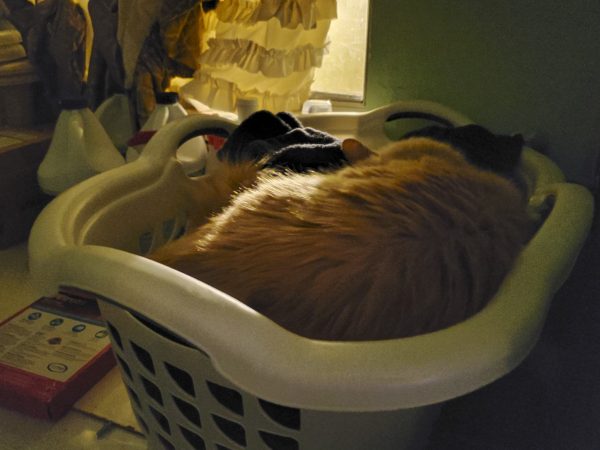
But, we have traditions which can help us through, like Thanksgiving ... oh, dangit Covid! So, ANYWAY, other traditions that do not involve Covid or Zoom, Nano traditions: the stats, and the excerpt. What did this month look like, Nano-wise?

This wasn't the hardest Nano I've handled ... I think the worst was being over 21,000 words behind in 2016 for PHANTOM SILVER, though briefly LIQUID FIRE in 2009 got almost that bad. Nor was it record-breakingly productive, like the astounding 25,000 words ahead finish on BOT NET 2017. This was a middle-of-the-road Nano, helped by really pouring on 12,000 words last weekend:

That was on purpose, so I could coast into Thanksgiving having finished, and spend a very nice dinner with my wife. (We had vegan muffulletas with
authentic olive salad filling shipped direct from Central Grocery in New Orleans, which I highly, highly, highly recommend). That left November's work on SPIRAL NEEDLE comfortably in the middle of my previous efforts:a
And so, now, an excerpt ...
Too late, I realized the thickening arms of the octopus mist echoed the ghostly glow of the streetlights. “Teleporter! We’ve got to find a weakness!” I cried, flicking and snapping my wrist to loose a crossbow bolt, a feather from my origami peacock—an analysis spell.
The feather flitted out, replicating itself in the flood of magic, its unfolding structure revealing an intricate, oh so intricate pattern embedded in the misty galaxy. Unfortunately, Nyissa, far older and faster than me, had fired her own analysis glyph.
Our spells collided in a flash of sparks and feathers.
“Damnit,” I cried, flinching. “Only one of us needed to do that—”
“Sorry, was reacting to your idea, not your action,” Nyissa said. “I—”
A long black shaft lanced out—and with a terrific report, blasted Nyissa in the face.
Nyissa flew back. Her mask shattered. It would have been so romantic to scream her name and lunge my hand toward her—but both of us had been in fights so many times before, and I instinctively swung the Waystaff up, its spine catching bayonet and flipping the long gun upwards. The hooked beak hissed, striped cloak flapping, and I saw the thing whole.
Towering. Raptor-beaked. Cloaked in tattered striped cloth, draped over a flaring dark greatcoat. Black leather straps bound a tortuously lean torso seemingly rippled with twitching muscle. But the clawed arms fighting mine held what looked like a musket, the striped cloak looked like the ruins of a flag, and atop the thing’s plague doctor mask was a tricorn hat.
“What are you?” I yelled, shoving against the musket with the Waystaff.
The thing screamed at me, foul smoke erupting from its beak, and I flinched and gagged. It wailed at me with its musket, alternately clubbing aside the Waystaff and jabbing at me with the bayonet, as sparking smoke roiled into what I assumed was the musket’s flintlock—it was preparing to fire! I leapt backward, spinning through a knight’s move version of the Dance of Five and Two, hastily pulling together a spell: “Spirit of flame, act as my shield!”
The plague knight screeched and dropped a grimy black ball into its musket—just as my Dragon tattoo uncoiled from my skin and looped around me in a helix of Technicolor scales and feathers. The plague knight fired with a clap of thunder—met by a gout of flame.
Wow! Excitement! Adventure! Tattoo magic versus magical monsters! And while we didn't get to see that much of the costumes in this excerpt, we've got cute vampires wearing sexy clothes fighting alongside our heroine in her long black vest / trenchcoat. What's not to like?
That is all for now. Until next time, please enjoy this picture of a cat.
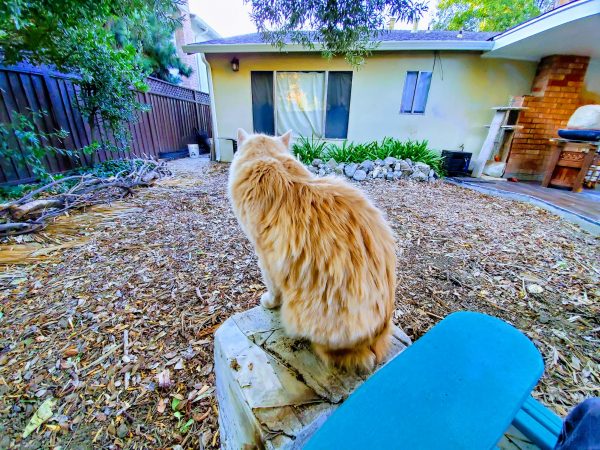
-the Centaur
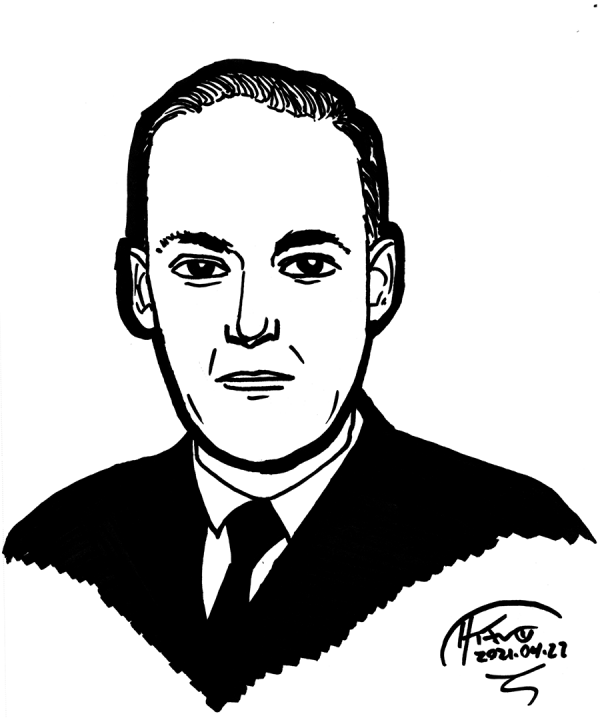 Quick sketch of H.P. Lovecraft. Not ... terrible ... per se, but I squashed his head, and there's something about the face that's wrong that also bothers me about the faces drawn by Steve Dillon in Preacher. Don't get me wrong - I love Preacher and Steve Dillon's art, but something has always struck me as slightly off about the faces in Preacher, and the same thing is going on here. If I knew what it was, I could probably fix it. But I don't, so I guess I just have to keep practicing.
Quick sketch of H.P. Lovecraft. Not ... terrible ... per se, but I squashed his head, and there's something about the face that's wrong that also bothers me about the faces drawn by Steve Dillon in Preacher. Don't get me wrong - I love Preacher and Steve Dillon's art, but something has always struck me as slightly off about the faces in Preacher, and the same thing is going on here. If I knew what it was, I could probably fix it. But I don't, so I guess I just have to keep practicing.
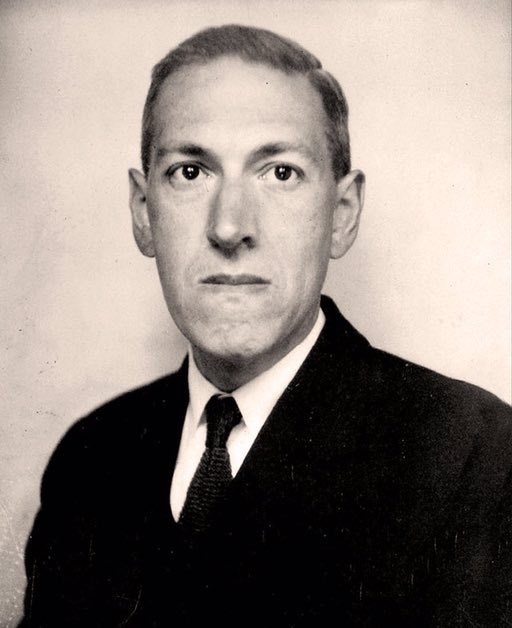 Drawing every day.
-the Centaur
P.S. 1800 words. Getting back on track on Nano.
Drawing every day.
-the Centaur
P.S. 1800 words. Getting back on track on Nano.  Imagine a man, who comes up tangentially during a writing session, and ends up having his mug featured in a quick Sharpie sketch on 9x12 Strathmore with no roughs whatsoever, capturing his likeness forever ... in the Twilight Zone. Meh, something's off, but I can't figure out what, with my drawing of Mr. Serling.
Imagine a man, who comes up tangentially during a writing session, and ends up having his mug featured in a quick Sharpie sketch on 9x12 Strathmore with no roughs whatsoever, capturing his likeness forever ... in the Twilight Zone. Meh, something's off, but I can't figure out what, with my drawing of Mr. Serling.
 Drawing every day.
-the Centaur
P.S. Wrote 3600 words too.
Drawing every day.
-the Centaur
P.S. Wrote 3600 words too. 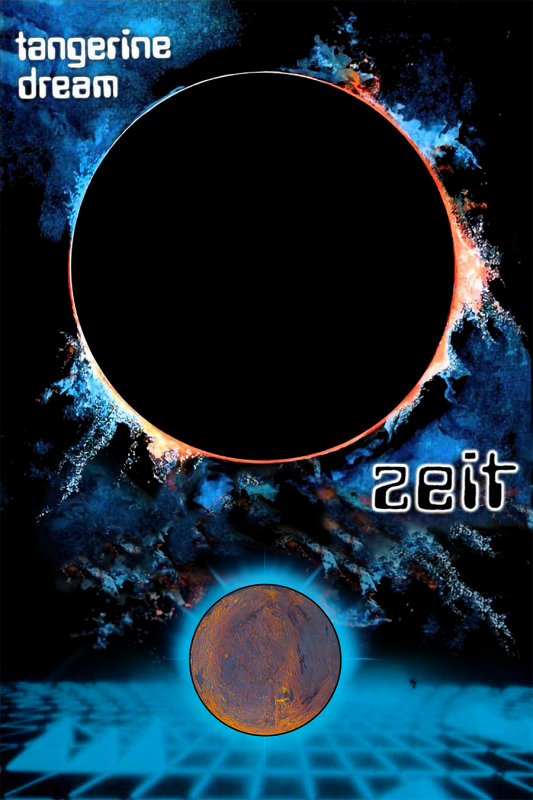 Technically not a drawing, but the outcome of some Photoshop experimentation to see if I could turn the
Technically not a drawing, but the outcome of some Photoshop experimentation to see if I could turn the  I like this simple version better, but I'm not committing to either right now; it was just an experimental idea to see if it was feasible, and also to practice some Photoshop. A final version would need a little more work on the blend of the cover, which is a quick hack right now.
Drawing, designing, Photoshopping every day.
-the Centaur
P.S. 1800 words. Starting to get a little more rhythm in the story. Rough draftiness:
I like this simple version better, but I'm not committing to either right now; it was just an experimental idea to see if it was feasible, and also to practice some Photoshop. A final version would need a little more work on the blend of the cover, which is a quick hack right now.
Drawing, designing, Photoshopping every day.
-the Centaur
P.S. 1800 words. Starting to get a little more rhythm in the story. Rough draftiness:
 Quick Sharpie sketch of Dita von Teese. Not bad overall, but I ended up badly screwing up the proportions and made her face so tall I had to shrink it vertically about 10%, which ... actually, wasn't so bad, compared to the original:
Quick Sharpie sketch of Dita von Teese. Not bad overall, but I ended up badly screwing up the proportions and made her face so tall I had to shrink it vertically about 10%, which ... actually, wasn't so bad, compared to the original:
 Ran across a more fetish-themed image of her as I was trying to design a waitress for a scene in SPIRAL NEEDLE; I judged said picture was too steamy for this drawing series, and the waitress ended up in a different outfit anyway, so you get a sketch of a glamour shot instead.
Drawing every day.
-the Centaur
P.S. 1700+ words on SPIRAL NEEDLE. Ahead of the wordcount, behind on how much I need to do to catch up, but at least, catching up is happening now.
Ran across a more fetish-themed image of her as I was trying to design a waitress for a scene in SPIRAL NEEDLE; I judged said picture was too steamy for this drawing series, and the waitress ended up in a different outfit anyway, so you get a sketch of a glamour shot instead.
Drawing every day.
-the Centaur
P.S. 1700+ words on SPIRAL NEEDLE. Ahead of the wordcount, behind on how much I need to do to catch up, but at least, catching up is happening now.
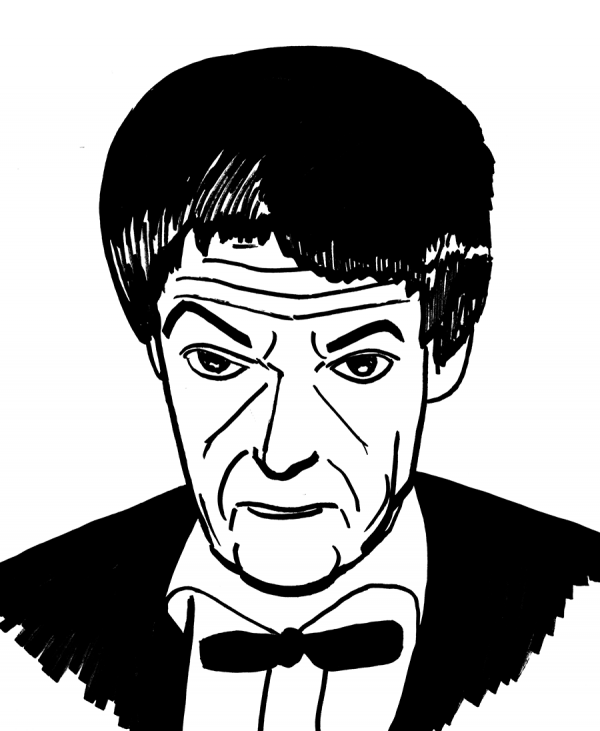 Super quick sketch of Patrick Troughton. Drawing every day. And wrote 1100 words.
-the Centaur
Super quick sketch of Patrick Troughton. Drawing every day. And wrote 1100 words.
-the Centaur  Sharpie sketch of Leslie Nielsen, another actor who has played a vampire (came up with Dakota mocking (in her head) a vampire she met). Roughed in non-repro blue, which was surprisingly easy to remove in Photoshop, but actually made it a little bit hard to tweak the roughs to get the landscape right (hence the tilted smile) and Sharpies, while forcing me to work quickly and helping me learn the role of blacks and whites in composition, are still doing no favors on the rendering.
Sharpie sketch of Leslie Nielsen, another actor who has played a vampire (came up with Dakota mocking (in her head) a vampire she met). Roughed in non-repro blue, which was surprisingly easy to remove in Photoshop, but actually made it a little bit hard to tweak the roughs to get the landscape right (hence the tilted smile) and Sharpies, while forcing me to work quickly and helping me learn the role of blacks and whites in composition, are still doing no favors on the rendering.
 Drawing every day.
-the Centaur
P.S. 1900+ words on SPIRAL NEEDLE. Onward.
Drawing every day.
-the Centaur
P.S. 1900+ words on SPIRAL NEEDLE. Onward.  Quick Sharpie sketch of Roger Moore. Head's a bit squashed, but it's not too bad. I admit, I threw my first drawing away and made myself start over, rather than deal with one messed up line in his right jawline. It's interesting to me how much of the character of even a very young Roger Moore is made up not just by that whale of a jaw, but by the subtle lines all over his face. He was strangely old even when young.
Quick Sharpie sketch of Roger Moore. Head's a bit squashed, but it's not too bad. I admit, I threw my first drawing away and made myself start over, rather than deal with one messed up line in his right jawline. It's interesting to me how much of the character of even a very young Roger Moore is made up not just by that whale of a jaw, but by the subtle lines all over his face. He was strangely old even when young.
 Drawing every day.
-the Centaur
P.S. Only ~800 words today, which was quite a struggle. Roger Moore came up very tangentially when Dakota was snarking about a vampire looking like a cross between Roger Moore and Leslie Nielsen.
Drawing every day.
-the Centaur
P.S. Only ~800 words today, which was quite a struggle. Roger Moore came up very tangentially when Dakota was snarking about a vampire looking like a cross between Roger Moore and Leslie Nielsen.  Quick Sharpie sketch of an
Quick Sharpie sketch of an  Drawing every day.
-the Centaur
Oh, and on Camp Nano: just got ~1000 words so far. Not sure why I got fewer words when I had more to do yesterday than today. Perhaps I need to break more paintings?
Drawing every day.
-the Centaur
Oh, and on Camp Nano: just got ~1000 words so far. Not sure why I got fewer words when I had more to do yesterday than today. Perhaps I need to break more paintings? 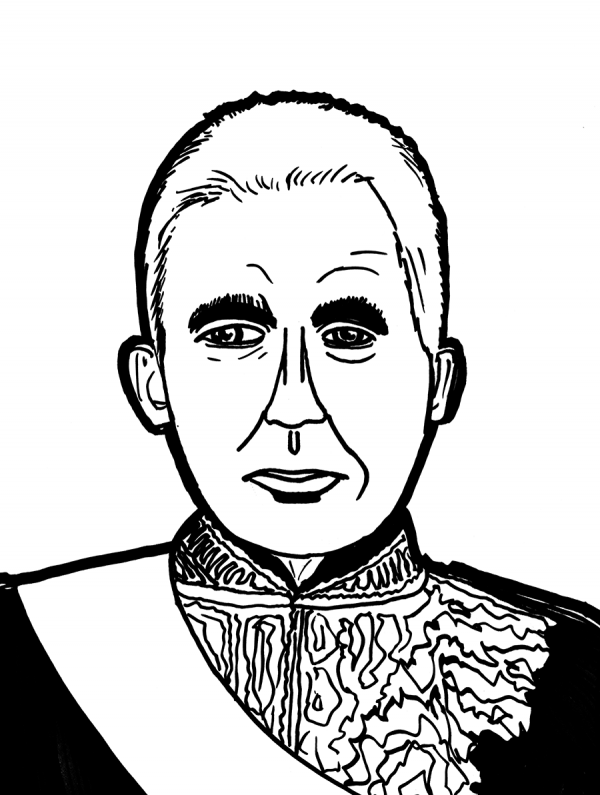 Quick Sharpie sketch of King Mongkut of Thailand, the famous king from The King and I, and also, not a bad mathematician and astronomer. Tangentially came up in today's Dakota Frost Camp Nano adventure (2300+ words today, still behind, but catching up). The real guy's head is more egg-shaped, and the left eye has an iris placement mistake: we are near the limit of what I can do with a Sharpie, but it's still the best tool I have to keep myself drawing when it's super late and I'm tired.
Quick Sharpie sketch of King Mongkut of Thailand, the famous king from The King and I, and also, not a bad mathematician and astronomer. Tangentially came up in today's Dakota Frost Camp Nano adventure (2300+ words today, still behind, but catching up). The real guy's head is more egg-shaped, and the left eye has an iris placement mistake: we are near the limit of what I can do with a Sharpie, but it's still the best tool I have to keep myself drawing when it's super late and I'm tired.
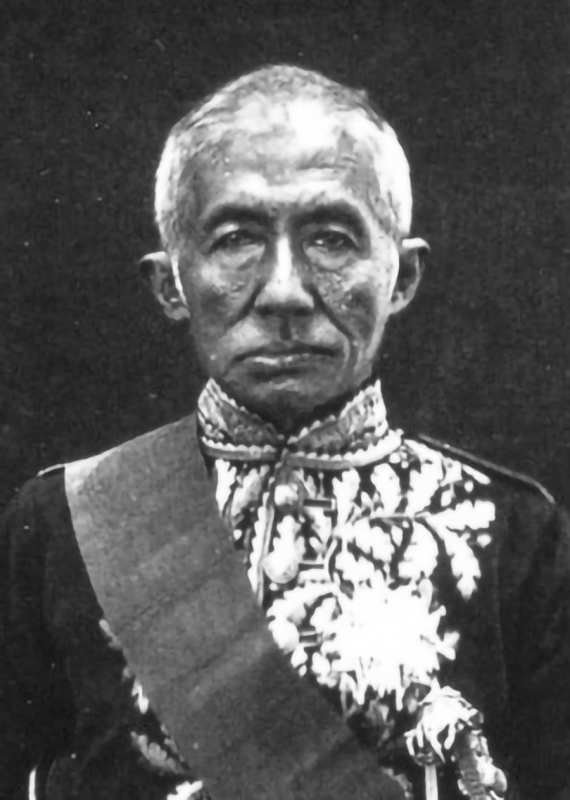 Drawing. Every. Day.
-the Centaur
Drawing. Every. Day.
-the Centaur  Sharpie sketch of Peter Capaldi from the Doctor Who episode "The Pilot," which is lightweight in tone and stakes but stands up surprisingly well to repeated viewings, especially Capaldi's knockout speech about time in the beginning, the Doctor's amazing office, and the introduction of the TARDIS.
The sketch is ... OK. Slightly squashed, and I'm still doing eyes too big (likely a function of the Sharpie sketches, which put a minimum size on the features I can draw). But it ... kinda looks like him? His head's not turned the right way, and I still have trouble getting the "landscape" of the face right.
Sharpie sketch of Peter Capaldi from the Doctor Who episode "The Pilot," which is lightweight in tone and stakes but stands up surprisingly well to repeated viewings, especially Capaldi's knockout speech about time in the beginning, the Doctor's amazing office, and the introduction of the TARDIS.
The sketch is ... OK. Slightly squashed, and I'm still doing eyes too big (likely a function of the Sharpie sketches, which put a minimum size on the features I can draw). But it ... kinda looks like him? His head's not turned the right way, and I still have trouble getting the "landscape" of the face right.
 Still, drawing every day.
-the Centaur
P. S. Only got ~50 words on Camp Nano, but I feel good about those words, as they're stitching parts of a scene together so I can really roll with it tomorrow. 11K words behind, but I've been behind worse.
Still, drawing every day.
-the Centaur
P. S. Only got ~50 words on Camp Nano, but I feel good about those words, as they're stitching parts of a scene together so I can really roll with it tomorrow. 11K words behind, but I've been behind worse.  Quick sketch - much of it, just a dry erase marker, not even a Sharpie - on Strathmore 9x12. Not completely terrible for the first two, but I sure did squeeze Bolton's head. Sorry, man.
Quick sketch - much of it, just a dry erase marker, not even a Sharpie - on Strathmore 9x12. Not completely terrible for the first two, but I sure did squeeze Bolton's head. Sorry, man.
 Drawing every day.
-the Centaur
P.S. Only 250 words with Camp Nano, but then, I still feel that maybe-vaccine headache, so, ugh.
Drawing every day.
-the Centaur
P.S. Only 250 words with Camp Nano, but then, I still feel that maybe-vaccine headache, so, ugh.  Quick Sharpie sketch of Dakota Frost, based on the model from the BLOOD ROCK / LIQUID FIRE covers. I tried to do this upside down at first, to "see" it better, and OH BOY it did not turn out well - the landscape was all off. So this is an even quicker sketch, because I need to get to bed early.
Quick Sharpie sketch of Dakota Frost, based on the model from the BLOOD ROCK / LIQUID FIRE covers. I tried to do this upside down at first, to "see" it better, and OH BOY it did not turn out well - the landscape was all off. So this is an even quicker sketch, because I need to get to bed early.
 Also, Camp Nano only got ~150 added words, but again, I need sleep. Rough draftiness:
Also, Camp Nano only got ~150 added words, but again, I need sleep. Rough draftiness:
 Just added roughly 250 words today. An excerpt, all first-drafty stuff:
Just added roughly 250 words today. An excerpt, all first-drafty stuff:
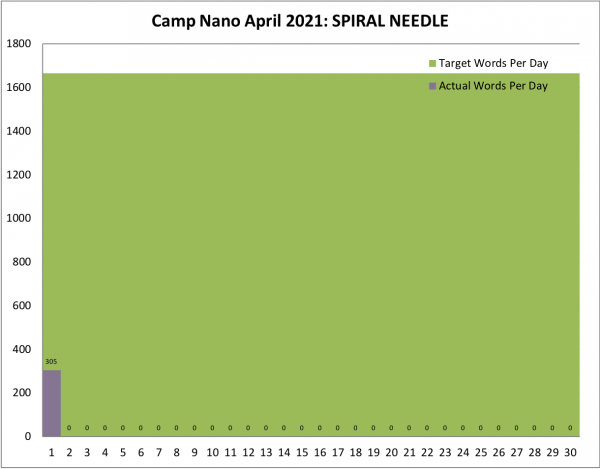 Taking on Dakota Frost, Book 7. Added 305 words. A raw unedited excerpt (including some prior text from Tuesday for context):
Taking on Dakota Frost, Book 7. Added 305 words. A raw unedited excerpt (including some prior text from Tuesday for context):
 So it's that time of year once again: I've won
So it's that time of year once again: I've won  ... and started a grand new vegan cooking adventure together ...
... and started a grand new vegan cooking adventure together ...
 And we even found and bought a new house, a very nice new place (it has turkeys) ...
And we even found and bought a new house, a very nice new place (it has turkeys) ...
 ... with a great space for my library and my wife's art studio, which we're in the middle of a slow motion move to while we renovate the old pad. These have been bright lights in an otherwise bad year. By you know how it's been: so stressful that - well, you've seen how much I've been blogging. I feel like this should be the best time ever in my life, yet 2020 has left me feeling a lot like this:
... with a great space for my library and my wife's art studio, which we're in the middle of a slow motion move to while we renovate the old pad. These have been bright lights in an otherwise bad year. By you know how it's been: so stressful that - well, you've seen how much I've been blogging. I feel like this should be the best time ever in my life, yet 2020 has left me feeling a lot like this:
 But, we have traditions which can help us through, like Thanksgiving ... oh, dangit Covid! So, ANYWAY, other traditions that do not involve Covid or Zoom, Nano traditions: the stats, and the excerpt. What did this month look like, Nano-wise?
But, we have traditions which can help us through, like Thanksgiving ... oh, dangit Covid! So, ANYWAY, other traditions that do not involve Covid or Zoom, Nano traditions: the stats, and the excerpt. What did this month look like, Nano-wise?
 This wasn't the hardest Nano I've handled ... I think the worst was being over 21,000 words behind in 2016 for PHANTOM SILVER, though briefly LIQUID FIRE in 2009 got almost that bad. Nor was it record-breakingly productive, like the astounding 25,000 words ahead finish on BOT NET 2017. This was a middle-of-the-road Nano, helped by really pouring on 12,000 words last weekend:
This wasn't the hardest Nano I've handled ... I think the worst was being over 21,000 words behind in 2016 for PHANTOM SILVER, though briefly LIQUID FIRE in 2009 got almost that bad. Nor was it record-breakingly productive, like the astounding 25,000 words ahead finish on BOT NET 2017. This was a middle-of-the-road Nano, helped by really pouring on 12,000 words last weekend:
 That was on purpose, so I could coast into Thanksgiving having finished, and spend a very nice dinner with my wife. (We had vegan muffulletas with
That was on purpose, so I could coast into Thanksgiving having finished, and spend a very nice dinner with my wife. (We had vegan muffulletas with  -the Centaur
-the Centaur 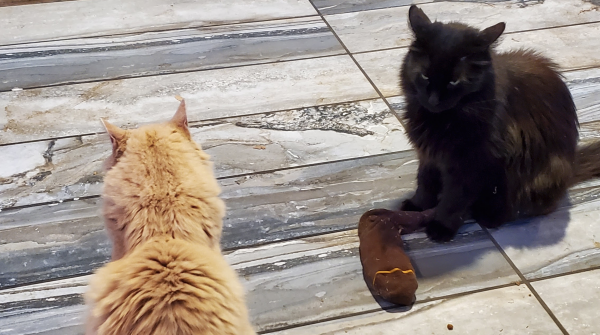 Wow, um, pandemics. SO, short story, I've been having a rough one, which is why you haven't seen me on this blog. Perhaps the story of my suffering is a story for another time, because I just found this Camp Nano post back from APRIL which was never published because, wow, um pandemics. Congratulations to you, zombie apocalypse, for throwing me off my game! Yay for you, Miss Rita, I guess?
SO ANYWAY, what I'd like to announce, what I planned to announce at the end of April but forgot to post, and now what I have to doubly announce at the end of July, is that I have completed the Camp Nanowrimo challenge to write 50,000 words in the month of April!
And, um, then, I did it again in July.
Wow, um, pandemics. SO, short story, I've been having a rough one, which is why you haven't seen me on this blog. Perhaps the story of my suffering is a story for another time, because I just found this Camp Nano post back from APRIL which was never published because, wow, um pandemics. Congratulations to you, zombie apocalypse, for throwing me off my game! Yay for you, Miss Rita, I guess?
SO ANYWAY, what I'd like to announce, what I planned to announce at the end of April but forgot to post, and now what I have to doubly announce at the end of July, is that I have completed the Camp Nanowrimo challenge to write 50,000 words in the month of April!
And, um, then, I did it again in July.
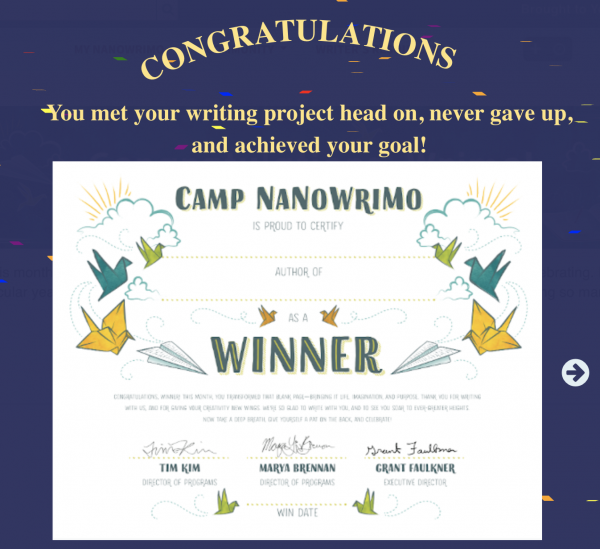 For those who don't know (how long have you been reading this blog?)
For those who don't know (how long have you been reading this blog?) 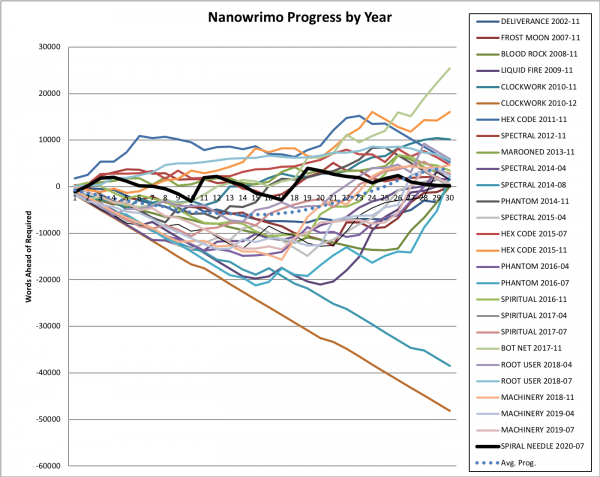 What was I working on?
This April, I mostly finished
What was I working on?
This April, I mostly finished 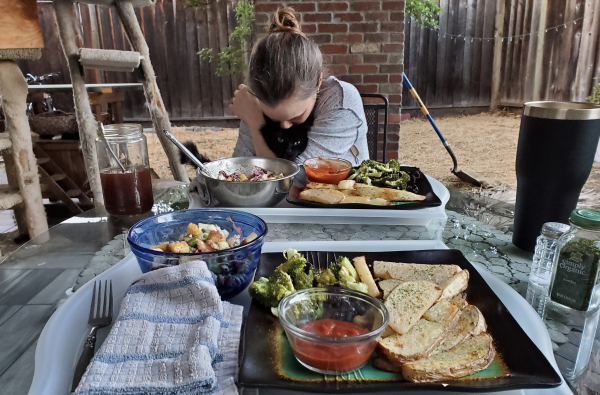

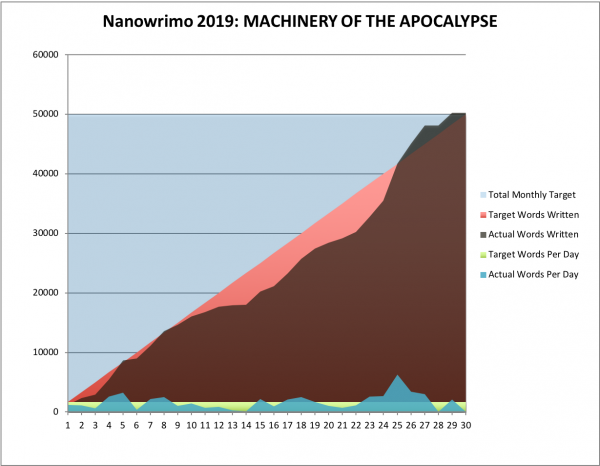 This month wasn't so bad, though there was a bit of a dip around the time I was writing report cards for our robot learning systems ("Little Johnny 5 tries very hard, but needs to work on his cornering!"). But, as usual, the week I took off for Thanksgiving "vacation" put me back on track:
This month wasn't so bad, though there was a bit of a dip around the time I was writing report cards for our robot learning systems ("Little Johnny 5 tries very hard, but needs to work on his cornering!"). But, as usual, the week I took off for Thanksgiving "vacation" put me back on track:
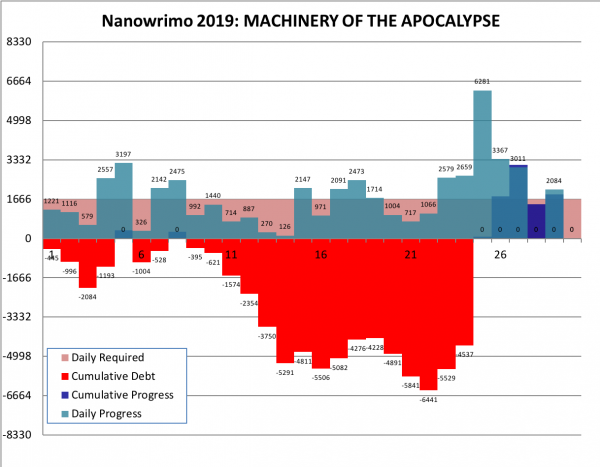 Yes, one day I did indeed get 6000+ words written, which was a record for the 25th of the month, but nowhere near my record of 9074 words - written on the 30th(!) of November 2016, in what I recall was a delerious mad dash sitting on my sofa wracking my brain to produce enough words to make my goal for PHANTOM SILVER. Frankly speaking, that sucked, and since then I have redoubled my efforts to ensure that I'm never THAT far behind.
Yes, one day I did indeed get 6000+ words written, which was a record for the 25th of the month, but nowhere near my record of 9074 words - written on the 30th(!) of November 2016, in what I recall was a delerious mad dash sitting on my sofa wracking my brain to produce enough words to make my goal for PHANTOM SILVER. Frankly speaking, that sucked, and since then I have redoubled my efforts to ensure that I'm never THAT far behind.
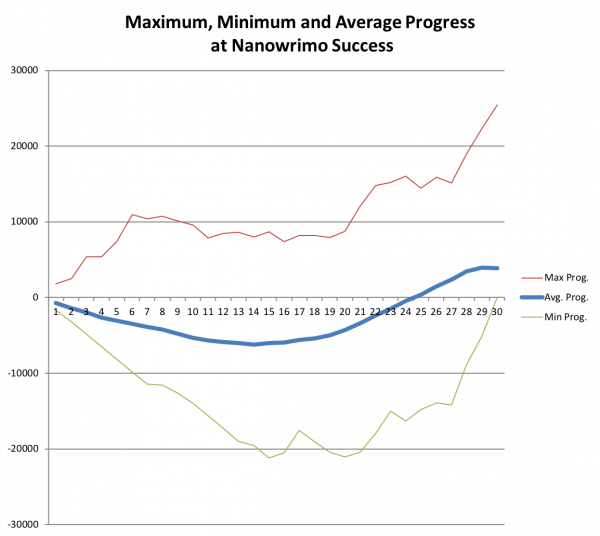 So this month looks typical. It's interesting to me how much Nano has become a part of my life. First tried in 2002, first made into a yearly habit in 2007, and first made into a thrice-yearly habit (Camp April, Camp July and November Nano) in 2014-2015 ... now I've done Nano 27 times, with 25 successes, for 1.36 million words of rough draft ... it's a heavy feeling.
So this month looks typical. It's interesting to me how much Nano has become a part of my life. First tried in 2002, first made into a yearly habit in 2007, and first made into a thrice-yearly habit (Camp April, Camp July and November Nano) in 2014-2015 ... now I've done Nano 27 times, with 25 successes, for 1.36 million words of rough draft ... it's a heavy feeling.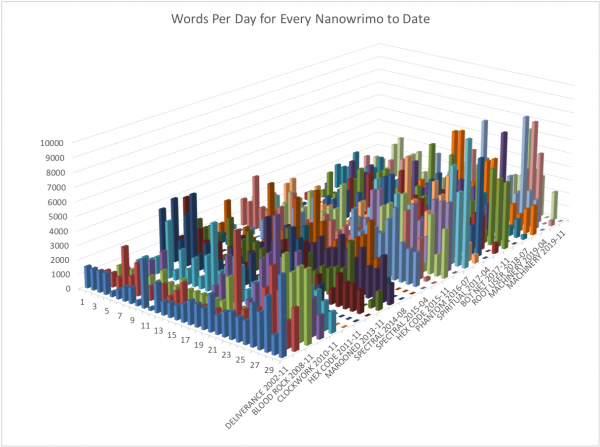 Do I want to keep doing this? Absolutely. I wish I had more time to, like, edit my books, so I didn't have a backlog of 6 finished novels, 2 novellas, and 5 partially finished novels. (Gulp!) But I like having a roof more, and the time and money to pay for my laptop, my nice dinners, and my late nite teas and mochas, so, teaching robots to learn by day it is, for the time being.
Do I want to keep doing this? Absolutely. I wish I had more time to, like, edit my books, so I didn't have a backlog of 6 finished novels, 2 novellas, and 5 partially finished novels. (Gulp!) But I like having a roof more, and the time and money to pay for my laptop, my nice dinners, and my late nite teas and mochas, so, teaching robots to learn by day it is, for the time being.
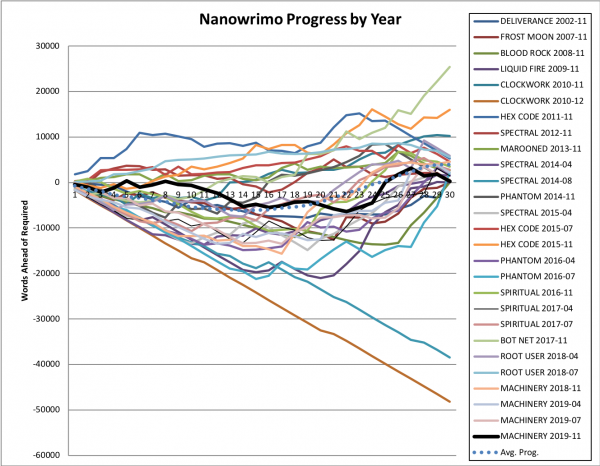 One of the most interesting things for me is how Nano breaks through your creative barriers. When I started on MACHINERY OF THE APOCALYPSE, then titled TWO YEARS OF HELL, I had the idea of writing an action-adventure steampunk hard science fiction story around computer science concepts, and conceived it as a connected tale made of 16 short stories --- two to the fourth power, a number beloved of many computer scientists.
But as I've written, the story has sprawled out from my original design, and there are at least two, perhaps three set pieces which may demand their own stories. Or perhaps existing stories will have to be cut or deleted. I don't know; I just create the worlds, but once they exist, they follow the laws of physics (plot and character physics). Here's an excerpt from one of those diversions, which may or may not make it into the final design:
One of the most interesting things for me is how Nano breaks through your creative barriers. When I started on MACHINERY OF THE APOCALYPSE, then titled TWO YEARS OF HELL, I had the idea of writing an action-adventure steampunk hard science fiction story around computer science concepts, and conceived it as a connected tale made of 16 short stories --- two to the fourth power, a number beloved of many computer scientists.
But as I've written, the story has sprawled out from my original design, and there are at least two, perhaps three set pieces which may demand their own stories. Or perhaps existing stories will have to be cut or deleted. I don't know; I just create the worlds, but once they exist, they follow the laws of physics (plot and character physics). Here's an excerpt from one of those diversions, which may or may not make it into the final design:

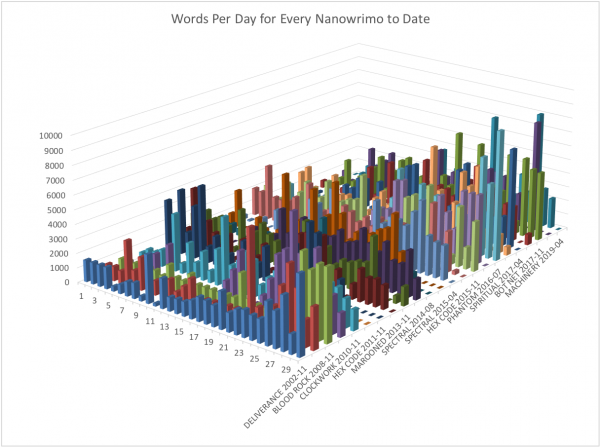 Every year, I donate to the Nanowrimo foundation to help them not just keep the lights on but to support young writers everywhere with their
Every year, I donate to the Nanowrimo foundation to help them not just keep the lights on but to support young writers everywhere with their 